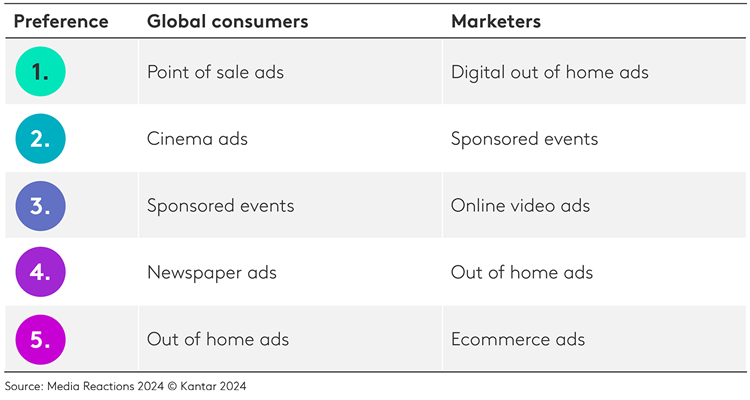Media and culture move together, conflated by technology, enabling new forms of creativity for brands and individuals. For marketers, it is essential to know which media channels and platforms are most relevant for your brand, because we know that ad campaigns are seven times more impactful among a receptive audience. The new habits and behaviours of younger generations across the world continue to alter the fundamentals of this landscape.
Understanding the media landscape allows you to know what touchpoints and what publisher partners to utilise for your different objectives to build predisposition towards your or your client’s brand. Similarly, it gives publisher brands an understanding of what they should be providing to their advertiser partners for their own brand growth.
An ad environment – which encompasses everything from the platform to the channel on which the ad is placed – is a key factor for any marketer to consider when planning media investment and potential ROI.
But why is the ad environment so important? Campaigns are seven times more impactful among a receptive audience – so it is essential to know what consumers think of media channels and brands to identify the most effective ones for your brand.
The media environment evolves rapidly and, “in an environment with so many options, marketers need to make careful choices” says Jane Ostler, EVP, Thought Leadership at Kantar.
So, how do you identify what will work best for your brand? And how can you follow, and adapt, to the latest cultural and media trends?
When it comes to choosing a platform or channel for your advertising campaign, there is no one-size-fits-all. Some media environments will be naturally more suited to your brand, comms strategy or campaign objectives, and some won’t. It’s important to get this right – as we have seen, advertising context can affect the success of your campaign.
Kantar Media Reactions takes some of the guesswork out of choosing the right ad platform for your brand. It is an annual study exploring the media landscape, this year with insights from around 18,000 consumers and 1,000 senior marketers around the world. Providing key media insights, it is the only global ad equity evaluation of media channels and media brands among consumers and marketers.
The report uses Kantar’s Ad Equity metric, which uniquely identifies the places where consumers most appreciate advertising and are least likely to view ads negatively. It provides a comprehensive view of the current media landscape, how it has evolved and how to navigate it.
Let’s look at some of the key findings from this year’s 2024 report.
Consumers are becoming more positive to ads. Around 47% are positive towards ads in general. Looking at channel trends in general, there has been a decrease in how fun and entertaining consumers find ads. However, repetitiveness and oversaturation of ads have improved significantly. Consumers are naturally more positive to ad exposure when the negatives they associate with ads are reduced.
The most preferred media channel is point of sale (POS) ads, taking the crown away from sponsored events. POS ads are seen as particularly relevant, useful and trustworthy. They also capture consumers’ attention more than the average ad. POS ads help marketers predispose consumers to their brands at the moment of purchase and are an indicator that the brand is more present, another brand growth accelerator. Brand growth requires active, intentional presence. A brand with a more prominent shelf presence or search listing has a higher likelihood of getting picked.
Read the free global booklet to find out the leading brand in your market. In previous years, many newer advertising platforms captured the hearts of consumers, but marketers took some time to sort out their feelings towards them. Netflix makes it into the top 5 of marketers easily in the first year they join Media Reactions. And the reason partially lies in brand safety.
In previous years, many newer advertising platforms captured the hearts of consumers, but marketers took some time to sort out their feelings towards them. Netflix makes it into the top 5 of marketers easily in the first year they join Media Reactions. And the reason partially lies in brand safety.
Netflix’s brand safety ranks among the top 3 for marketers, following Google and YouTube. An interesting result, not necessarily for Netflix with their strict content controls, but for especially YouTube where most content is user-created. The moderation efforts of the platform seem to have paid off, as marketers put their faith in them.

The key to setting up a successful communications strategy or a new campaign is to start with fundamental knowledge of the media landscape in your market. Combining media insights from Kantar Media Reactions with other effectiveness data sources, such as in-context creative testing, will help you make the right media investment decisions.
Get in touch to find out more about the winning brands in each market and how Kantar’s media experts can help your brand’s marketing strategy and media decisions.
Learn more about Media Reactions 2024; download the free booklet and watch the on-demand webinar.
Understanding the media landscape allows you to know what touchpoints and what publisher partners to utilise for your different objectives to build predisposition towards your or your client’s brand. Similarly, it gives publisher brands an understanding of what they should be providing to their advertiser partners for their own brand growth.
Why does ad placement matter?
An ad environment – which encompasses everything from the platform to the channel on which the ad is placed – is a key factor for any marketer to consider when planning media investment and potential ROI.
But why is the ad environment so important? Campaigns are seven times more impactful among a receptive audience – so it is essential to know what consumers think of media channels and brands to identify the most effective ones for your brand.
The media environment evolves rapidly and, “in an environment with so many options, marketers need to make careful choices” says Jane Ostler, EVP, Thought Leadership at Kantar.
So, how do you identify what will work best for your brand? And how can you follow, and adapt, to the latest cultural and media trends?
When it comes to choosing a platform or channel for your advertising campaign, there is no one-size-fits-all. Some media environments will be naturally more suited to your brand, comms strategy or campaign objectives, and some won’t. It’s important to get this right – as we have seen, advertising context can affect the success of your campaign.
How can Kantar Media Reactions help?
Kantar Media Reactions takes some of the guesswork out of choosing the right ad platform for your brand. It is an annual study exploring the media landscape, this year with insights from around 18,000 consumers and 1,000 senior marketers around the world. Providing key media insights, it is the only global ad equity evaluation of media channels and media brands among consumers and marketers.The report uses Kantar’s Ad Equity metric, which uniquely identifies the places where consumers most appreciate advertising and are least likely to view ads negatively. It provides a comprehensive view of the current media landscape, how it has evolved and how to navigate it.
Let’s look at some of the key findings from this year’s 2024 report.
Top-ranking media channels - global
Consumers are becoming more positive to ads. Around 47% are positive towards ads in general. Looking at channel trends in general, there has been a decrease in how fun and entertaining consumers find ads. However, repetitiveness and oversaturation of ads have improved significantly. Consumers are naturally more positive to ad exposure when the negatives they associate with ads are reduced.The most preferred media channel is point of sale (POS) ads, taking the crown away from sponsored events. POS ads are seen as particularly relevant, useful and trustworthy. They also capture consumers’ attention more than the average ad. POS ads help marketers predispose consumers to their brands at the moment of purchase and are an indicator that the brand is more present, another brand growth accelerator. Brand growth requires active, intentional presence. A brand with a more prominent shelf presence or search listing has a higher likelihood of getting picked.
Top-ranking media channels - global

Top ranking media brands - global
This year, the most preferred advertising platform spot is shared by Amazon and TikTok, both previous winners in the rankings. They do so with completely different profiles of consumer ad attitudes. Amazon ads are seen as particularly relevant and useful, while TikTok stands out as the platform with the most fun and entertaining ads for the fifth year in a row. Its ads are also fairly attention-capturing.Read the free global booklet to find out the leading brand in your market.
Top-ranking media brands - global
 In previous years, many newer advertising platforms captured the hearts of consumers, but marketers took some time to sort out their feelings towards them. Netflix makes it into the top 5 of marketers easily in the first year they join Media Reactions. And the reason partially lies in brand safety.
In previous years, many newer advertising platforms captured the hearts of consumers, but marketers took some time to sort out their feelings towards them. Netflix makes it into the top 5 of marketers easily in the first year they join Media Reactions. And the reason partially lies in brand safety.Netflix’s brand safety ranks among the top 3 for marketers, following Google and YouTube. An interesting result, not necessarily for Netflix with their strict content controls, but for especially YouTube where most content is user-created. The moderation efforts of the platform seem to have paid off, as marketers put their faith in them.
Top ranking media brands for...

Media landscape across generations
Each generation has their own needs. Some brands appeal to all, such as Amazon, which appears in every generation's top three. Brands often expected to appeal to younger people are in fact the most preferred ad environments for older generations: TikTok ads tops the list for boomers and is second for Gen X. Gen X and Gen Y are particularly positive towards ads on Snapchat. Meanwhile, Gen Z has ads on the more established social media platform Facebook, in second place.
Most preferred media brands by generation

The media landscape isn't just about media brands. Attitudes towards specific advertising elements can be equally important in understanding how to customise communications with consumers.
Read the free booklet to find out different generations’ preferences in terms of creative elements and many other details.
Navigating the cultural tides
As we have seen, the media landscape is exciting and never stops evolving. This past year, media channels’ and brands’ perceptions shifted globally and locally, among consumers of different socioeconomic backgrounds and among advertisers, agencies, and publishers.The key to setting up a successful communications strategy or a new campaign is to start with fundamental knowledge of the media landscape in your market. Combining media insights from Kantar Media Reactions with other effectiveness data sources, such as in-context creative testing, will help you make the right media investment decisions.
Get in touch to find out more about the winning brands in each market and how Kantar’s media experts can help your brand’s marketing strategy and media decisions.
Learn more about Media Reactions 2024; download the free booklet and watch the on-demand webinar.


